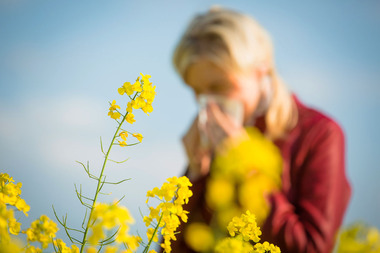
The pollen season starts very early this year as well, depending on the region. Those who already have complaints will find helpful tips here. But nature also has a lot to offer in the way of prevention.
Hazel and alder are this year's harbingers of the pollen season- In some regions of Germany, this pollen is already spreading in January, as the pollen flight hazard index of the German Weather Service shows. In addition, more and more cases of pollen allergy are being recorded - a phenomenon attributed to climate change. This is because the mild weather causes the allergy triggers to fly earlier and earlier and also makes them more aggressive.
Those who are affected by pollen allergy can rely on various effective household remedies. Black cumin oil, for example, can be used preventively or for acute complaints. Its unsaturated fatty acids have anti-inflammatory and anti-allergic effects. It can be taken as oil or in more neutral-tasting capsules. Those who suffer from itchy eyes can help themselves with compresses containing eyebright. For this purpose, allergy sufferers pour a tablespoon of boiling water over a quarter litre of eyebright, then filter and allow to cool. Sterile compresses can be soaked with it and placed on the eyes.
If hay fever occurs in combination with bronchial mucus and histens, it helps to inhale with salt water or fennel oil. Sea buckthorn oil is recommended for rubbing in irritated nasal mucous membranes. Manuka honey with a high MGO content (the antibacterially active component methylglyoxal) can be taken preventively during the pollen-free period, but also in the acute stage. The regular consumption of regional honey is also said to help, because the body can desensitize itself and adapt to the locally occurring pollen.
Propolis strengthens the immune system and inhibits the release of histamine. Applied externally as an ointment, it can soothe irritated nasal mucous membranes. It also has a bacteriostatic effect. Among the popular and proven household remedies are always tea recipes, such as tea made from antibacterial and anti-inflammatory sheep's milk, milk thistle to reduce the release of histamine or stinging nettle, which blocks the release of histamine. Sage tea has a disinfecting effect. Ginger, the all-purpose weapon for colds, also helps with allergic rhinitis.
Pollen exposure can also be reduced by vacuuming the home regularly, airing during periods of low pollen count and not storing laundry worn outside in the bedroom. Whoever eats a fresh, vitamin-rich and histamine-poor diet strengthens their immune system. Vitamin C is particularly important for hay fever, as it acts like an antihistamine. A healthy intestinal flora is also the prerequisite for a well-functioning immune system.










